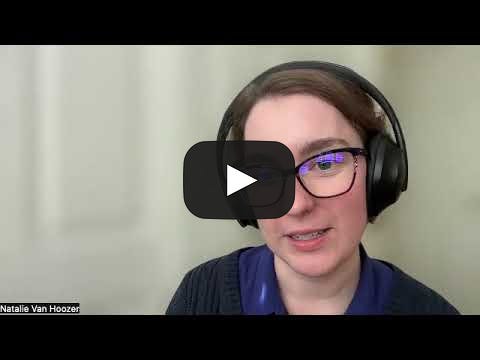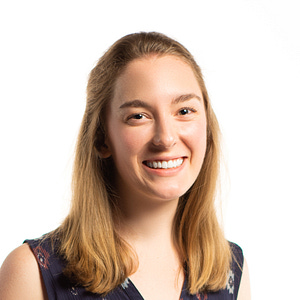You’re reading the My News Biz newsletter, which I will be sending you every other Thursday. My goal is to help you and other digital media entrepreneurs to find a viable business model that works for you. If you were forwarded this email, you can sign up here. She's forging a career in bilingual journalismIt takes a willingness to try new things, do internships, be persistent (and patient)You’re reading the Your News Biz newsletter. My goal is to help digital media entrepreneurs find viable business models. As I like to say, it’s another day of opportunity, and now our opportunity is to talk with Natalie Van Hoozer. She’s recently been named community manager for LION Publishers, a nonprofit whose mission is to strengthen local news outlets. I’ve watched Natalie forge her own career path in journalism and communication for several years. I’ve been impressed with the variety of her roles and experiences:
Note: I’ve edited our conversation for length and clarity. All boldface emphasis in the text is mine.— James Breiner Getting startedJames: So tell us about how you got started in your career, Natalie. I wanted to have our readers get a sense of how it is these days for a young person coming out of journalism school or working in media. Natalie: That's always one of my favorite things to talk about. Well, the first thing I always love to mention to journalism students when I go speak to classes is to value any experience you can get working in local news. I got my start in my second year in journalism school by working on Noticiero Móvil (Mobile News), which is a faculty-run student bilingual newsroom. I was double majoring in journalism and Spanish, and I had just enough Spanish that I was able to go out and do interviews and then work with my classmates who had complementary skills. So I took that experience and then did more internships with our local NPR station, KUNR Public Radio. I was doing bilingual reporting for them focused on different topics related to immigration and politics.
Professors and colleaguesJames: So that journalism school must have been good. Any particular professors who you learned a lot from? Natalie: One of them was the founder of the Noticiero Móvil student newsroom, Vanessa Vancour. She’s not with the journalism school now, but she really supported how students with complementary skills could do bilingual reporting. And then I had some other professors who supported me as I pitched international reporting projects. On one I was working with a colleague in Mexico City to tell a story about a young man who had followed his father to Mexico when his father was deported from Nevada. James: Tell us about your first job after graduation. Natalie: When I graduated, despite my experience, I ended up not working as a full time journalist. As my first job, I was a program assistant at the International Center for Journalists in Washington, D.C., and I worked with the Knight Fellows department. Then I moved over to their Latin American programming. I'm always looking for roles that allow me to keep learning the Spanish language and about all of the cultures that come with it. So with that work, I worked on projects that supported Mexican journalists on the Mexico side of the border, organizing investigations and trainings and evaluating journalists for scholarships and grants and things like that. I'm always looking for places that are a hub for lots of different journalists, because then I'm going to meet a lot of these people and learn so much from them when they come across my path, and that's exactly what happened with ICFJ. What I have noticed is that how to be an entrepreneur, a media entrepreneur, or how to be an independent journalist isn't taught much in journalism schools. But as someone who has studied independent journalism, entrepreneurial journalism, for a long time, James, what would your advice be to people entering the workforce and interested in that? Build a portfolioJames: The advice I give to any journalism students, Natalie, is develop a portfolio of work while you're in school. Use your course work as an opportunity to build your portfolio of whatever you’re good at or interested in. If you're good at research and writing, produce that and put it on a blog, or publish it somewhere — on social media, wherever. Get your work out there. It's very important that you be producing something and that you have something to show. And that could be videos, it could be audio reports, podcasts, photography whatever it is that you feel like you're good at and that you enjoy, especially if it's something very, very narrow and way out there. When I started teaching at the University of Navarra, Tiktok, was considered way below the attention of university students. They thought it was for little kids. They disregarded it, made fun of it. By the time I left a few years ago, more than half my students were using Tiktok. So the technology can change. So the other piece that I would teach was the importance of ethical production, that you make every effort to get the most accurate, honest, fair product that you can so that it can withstand criticism. You might argue for one position or another, but make sure that all the information and data you gather at interviews is presented honestly, fairly, and as accurately as possible. So those would be the main things. Natalie: Just to add on to that idea, it’s something related to how I got into community engagement work and as a student. In order to be accurate and fair and represent things as precisely as I could, I shared that reporting back out with the people who I featured in it, whether it was local day laborers or Latina business owners, and to get their honest feedback on what did you think of this story? I want to know how you feel you were portrayed in the story. I wanted to know how they felt about how I reported about them and with them. And I really took that feedback to heart to further my reporting going forward. Fact-checking feedback loop. When I was independently employed, I was doing community engagement or community-centered reporting for the radio station, and with Factchequeado, the Spanish language fact-checking organization. Fact checking is so much about that feedback loop. You start the reporting process by asking the community and your audience what they want to know, what their questions are, what their concerns are. Have that inform the reporting, and then share that reporting back with them to let them know that their time and their effort was really worthwhile. That fits with how you go about finding what's accurate, what's a good way to represent things fairly. Supporting local mediaJames: So tell us a little bit about LION, where you’re working now. How big is the organization? What do they do? What do you do with them? Natalie: I am the new community manager, so I am working closely with the rest of the membership and coaching team to support the over 500 media organizations that are local independent online publishers in the LION community. And so my role is to get to know all of these organizations well and figure out what support they need from LION when it comes to sustainability. That's where we can help them. We can do a sustainability audit, figure out what they need to in order to continue on as an independent media organization, how they can learn from other members of LION. Impact of WashingtonJames: That’s really necessary these days, because journalism, which used to be a pretty good business, is not a very good business anymore. Some organizations depended on grants that came through USAID, but even that’s in doubt these days. What are you seeing? Natalie: I think everyone's trying to figure out what it means. For the most part, with my work at LION, it's not impacting our community as much because so many local, independent publishers really make sure to not use funding that is linked to federal funds. But what I'm seeing more is through my work with SembraMedia, and all the implications that are coming with USAID funding being frozen, and all of the different media support for international projects that is just on hold right now. And that includes projects that benefit the bilingual media community here in the U.S. and Canada. It demonstrates the importance of diversifying one's funding model. If you depend on one funding source that's supporting a large part of your work, and then it's just gone overnight, that can be really impactful for the organization. Next time: Natalie talks about how to develop the technology skills you need to launch career in journalism or communication. Below is the complete interview with Natalie, with subtitles.  ++++
+++++ You're currently a free subscriber to Your News Biz. For the full experience, upgrade your subscription. |
EL PERIÓDICO DE LOS PERIÓDICOS. SOMOS NOTICIAS. Para publicar, contactar: aliazon.comercialyventas@gmail.com
Páginas
- Inicio
- NACIONAL ESPAÑA
- INTERNACIONAL
- BOLETINES DIARIOS
- PORTADAS
- SOCIEDAD
- POLÍTICA
- SECCIONES
- ARTÍCULOS
- ECONOMÍA
- CULTURA
- NOTICIAS TURISMO
- PERIODISTAS
- REVISTAS
- NOTICIERO
- HEMEROTECAS
- REDES SOCIALES
- EVENTOS
- CLIMA
- PUBLICIDAD
- MENÚ
- COMUNICADOS DE PRENSA
- BOLETINES INFORMATIVOS
- MUNDO RURAL
- FEMINISMO
- GASTRONOMÍA
- EMPRESAS
- EL TIEMPO
- RADIO Y TELEVISIÓN
- CIENCIA
- MOTOR
- CONSUMO
- EDUCACIÓN
- TOROS
- OPINIÓN
- BLOGS
- ELECCIONES
- PODCASTS
- PASATIEMPOS
- NEWSLETTERS
- EMPLEO
- SERVICIOS
- SALUD
- ARTE
- BELLEZA
- LIBROS
- NEGOCIOS
- MEDIO AMBIENTE
- TECNOLOGÍA
- LOTERÍAS Y JUEGOS
- MODA
- OTROS
- HORÓSCOPO
- LIFESTYLE
jueves, 6 de marzo de 2025
She's forging a career in bilingual journalism
Suscribirse a:
Enviar comentarios (Atom)
ARTÍCULOS
¿Tienes información sobre alguna noticia interesante? aliazon.comercialyventas@gmail.com
ROPA Y COMPLEMENTOS ALIAZON
ROPA Y COMPLEMENTOS
OPINIÓN

Opinión y análisis // Diariocrítico.com
Artículos de Opinión | El Independiente
RSS de noticias de opinion
OPINION EL CONFIDENCIAL
Estrella Digital :: Últimas opiniones
Nuevatribuna :: Últimas opiniones
OPINIÓN-KHAMENEI
ÚLTIMAS NOTICIAS

ÚLTIMAS NOTICIAS
Últimas noticias // Diariocrítico.com
Estrella Digital :: Últimas noticias
Comentarios en: Últimas noticias
RSS de noticias de ultima-hora
PORTADAS
RSS de noticias de portada
NACIONAL ESPAÑA

Noticias nacionales | Diariocritico // Diariocrítico.com
MUNDO-KHAMENEI
CULTURA
ARTE
Arte y Cultura // Diariocrítico.com
TEATRO
Salud y vida saludable // Diariocrítico.com
SEXUALIDAD
Sexualidad y salud sexual y para disfrutar de las relaciones en pareja // Diariocrítico.com
SALUD
HISTORIA
Canal Historia // Diariocrítico.com
TURISMO
SOCIEDAD

Sociedad EL CONFIDENCIAL
LIFESTYLE
Estilo Hombre
MODA
CRÓNICA ROSA
Noticias del Corazón // Diariocrítico.com
LO MÁS LEÍDO
Lo más leido de la semana // Diariocrítico.com
CIENCIA
LIBROS
Noticias de libros, editoriales, autores y premios literarios // Diariocrítico.com
ECONOMÍA

Economía-EL CONFIDENCIAL
La actualidad económica en vivo - France 24
RSS de noticias de economia
COMENTARIOS DE ECONOMÍA
Comentarios de la Economía // Diariocrítico.com
Noticias economicas | Diariocritico // Diariocrítico.com
MERCADOS

Mercados - EL CONFIDENCIAL
EMPRESAS

Empresas - EL CONFIDENCIAL
FINANZAS






No hay comentarios:
Publicar un comentario